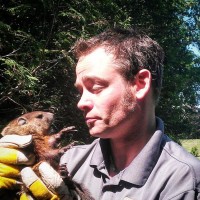
Wiarton Willie says 6 more weeks of winter, while Punxsutawney Phil and Shubenacadie Sam predict an early spring. We say majority rules! The famous groundhogs may be split on the forecast for the next few weeks, but based on the calls Skedaddle Humane Wildlife Control has been getting, we side with Phil and Sam- we predict an early spring, and a big baby season!
Skedaddle Humane Wildlife Control believes the late arrival of winter temperatures this year will have a bigger impact on urban wildlife than the end of winter. Urban wildlife such as raccoons, squirrels, skunks, birds and mice have benefited from the lack of snow and availability of food until a few weeks ago, which will translate into larger litters.
“When these animals are fattened by more food availability and a lack of cold temperatures,” notes Skedaddle Humane Wildlife Control President Bill Dowd, “biology often kicks in and gives them more offspring. The weakest of the animals sometimes die in a harsh winter. More will be able to survive this winter, which will mean more babies.”
“We started getting calls of animals mating in homeowners attics in early January, which is unusually early, notes Dowd. “If mating season for raccoons, squirrels and skunks occurred earlier this year because of warm weather, we can expect to see babies born in February, instead of March,” he adds.
Best to Remove Animals before Babies are Born
Skedaddle Humane Wildlife Control recommends that homeowners remove wildlife from their houses and outbuildings before babies are born to reduce stress on the animals. Although wildlife technicians are careful not to separate newborns from their moms, it does stress the family when they have to find an alternate den or nesting site. The cost of removing a single animal is also much less than an entire family of raccoons, squirrels or skunks. Mice also reproduce very quickly and catching a pair of them could stem a much larger population later on.
Listen and look for Sign of Wildlife Instructions
Different animal’s exhibit unique behaviors are they prepare for birthing but homeowners should check for the following signs of animals in the house
- Sounds of chewing or scurrying in the roof, attic, walls, chimney, vents or basements
- Any damaged building materials (soffit, shingles, eavestrough, roof/wall vents that show sign of entry
- Feces around entry holds or gathering in certain areas. Note: Raccoon feces is commonly infected with a roundworm known as Baylisascaris, which if ingested can cause nauseas, organ malfunction, loss of muscle control and even death
- Increased activity of animals around the area, indicating behavior or nest preparation
Damage Can Be Significant
These animals can be quite persistent in getting into their dens, and homeowners often become frustrated at not being able to keep the industrious animals from ripping up siding, flashing or vents. Attic insulation can also be severely damaged and contaminated by animal urine and feces, causing homeowners higher heating costs and the headache of cleanup and re-insulating. Mice are especially difficult to exclude because of their small size and ability to find alternative entry holes. Skedaddle Humane Wildlife Control provides a lifetime guarantees on our exclusion services.
can also be severely damaged and contaminated by animal urine and feces, causing homeowners higher heating costs and the headache of cleanup and re-insulating. Mice are especially difficult to exclude because of their small size and ability to find alternative entry holes. Skedaddle Humane Wildlife Control provides a lifetime guarantees on our exclusion services.
Call Skedaddle Humane Wildlife Control: 1-888-592-0387. Proudly serving: Ottawa, Montreal, Halifax, Hamilton, Burlington, Oakville, Mississauga, Brampton, Kitchener-Waterloo, Guelph, Cambridge and the Niagara Region.


